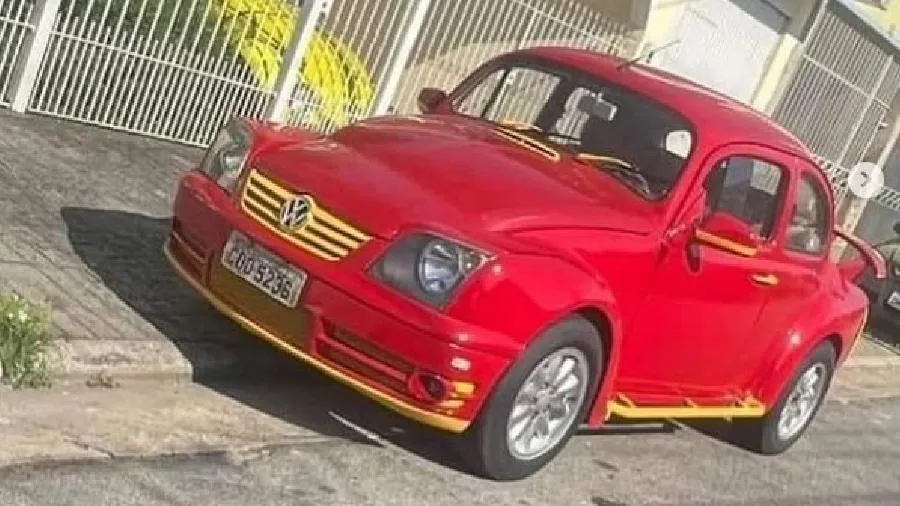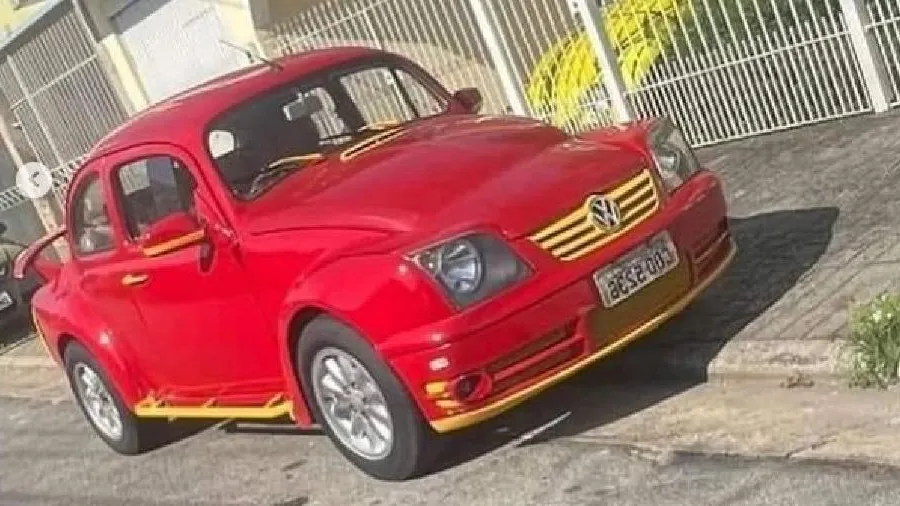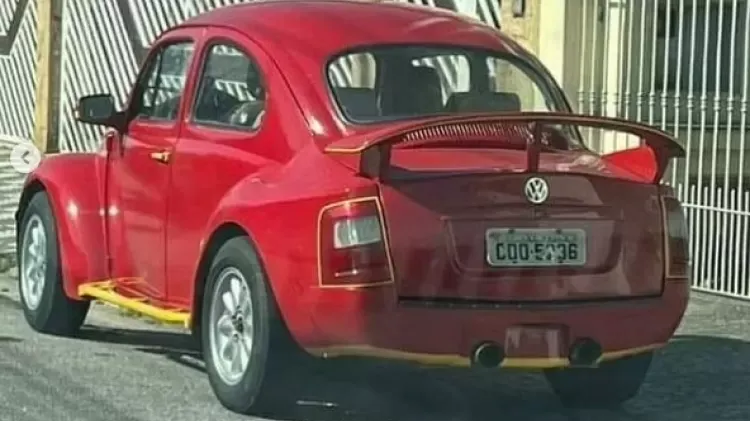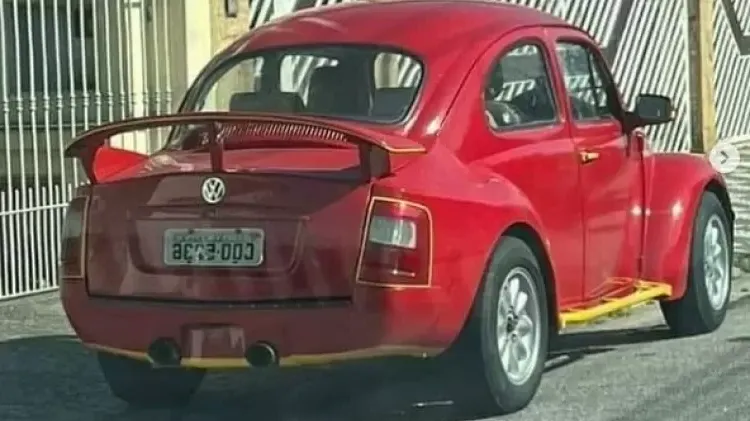When we think of the word creativity, we quickly remember innovations that have shaped the world. However, when this creativity is applied to Brazilian automotive culture, the combination can result in creations so unusual and, at the same time, fascinating, that they make us wonder: Why didn't we think of this before? The famous “FusEGolSport”, a humorous example of automotive modification, makes us reflect on how unpredictable and ingenious Brazilians can be when transforming a simple vehicle into something completely different.
In this article, we will explore not only the impact that “FusEGolSport” has on Brazilian automotive culture, but also the legal and practical implications of such bold modifications to street vehicles. Stay with us and understand what is behind this work that defies the limits of imagination.
The “FusEGolSport”: A Frankenstein Car or a Work of Art?

“FusEGolSport” is the true definition of a Frankenstein on wheels. With a combination of parts from completely different cars, this vehicle has become a true icon of automotive modification Brazilian. Imagine the scene: a beetle, which originally dates back to decades past, with wheels of Omega, the trunk lid of a Vectra, headlights and taillights of the EcoSport (from the first generation) and a front of Goal G3. What seemed like a disjointed jumble has turned into something that defies the aesthetic and mechanical conventions of a regular car.
And as if that wasn't enough, the owner of “FusEGolSport” even decided to add a sporty touch to the look, with a vibrant two-tone paint job and a large rear spoiler, creating an appearance that is reminiscent of a Beetle coupe. It is not difficult to imagine that, upon seeing this car for the first time, many would think: “Why Volkswagen never thought of that before?” It’s such a bold creation that it could very well become the model for a sports car.
Unusual Aerodynamics and Technical Implications

Although aesthetics is something totally subjective, there is an important question to be raised: aerodynamics from “FusEGolSport”. The combination of different parts from different cars may in fact have caused a change in the behavior of the air around the vehicle. Every time a hatchback (like the Beetle, which has a more vertical rear) is compared with a sedan (which has a more elongated rear), the sedan tends to offer less air resistance due to its more fluid design. Did this mix of parts actually bring about a superior aerodynamics to “FusEGolSport”?
Although this issue needs further analysis, the theory of air resistance reduction applies, and it is possible that the “FusEGolSport” has become more efficient in terms of aerodynamics than the beetle original. But this is a question that requires more than simple speculation: real tests and measurements would be necessary to prove whether the modifications really worked in favor of the vehicle's performance.
Safety at “FusEGolSport”: What Needs to Be Considered

One of the most worrying aspects of this change is the security. The Beetle, in itself, is not exactly an example of safe vehicle. When considering adding different car parts, it is necessary to analyze the impact that these changes may have on the structure and safety of the vehicle, such as resistance in the event of a collision or the stability of the modified chassis.
For example, the Vectra trunk lid or the EcoSport headlights They may be aesthetically appealing, but they can alter structural and aerodynamic characteristics that compromise the safety of the vehicle. And we must not forget that the engine of the “FusEGolSport” may have remained the same as the original Beetle or, who knows, may have been modified as well. However, if the engine was not adapted correctly, this could result in unexpected risks for the driver and for other drivers on the road.
Vehicle Legislation and Modifications: What Does the Law Say?

Although the “FusEGolSport” was a purely aesthetic and even daring creation, there are legal rules and regulations for vehicle modification in Brazil. According to the Brazilian Traffic Code (CTB), any vehicle that undergoes modifications must be registered and authorized by the responsible traffic authorities, such as the DMV. Cosmetic modifications are generally permitted, as long as they do not compromise the safety of the vehicle or compliance with traffic regulations.
O Article 98 of the CTB requires that any changes to the vehicle be authorized by the state's executive traffic authority. However, not all modifications are authorized by law. Contran Resolution 916/2022, for example, lists the permitted modifications, and for those involving mix of different models, the legislation is even stricter.
O Article 10, Clause III, the resolution mentions that “it is prohibited to replace the chassis or monoblock of a vehicle with another chassis or monoblock” in cases of modification. The “FusEGolSport”, with its combination of different models and parts, may fall into a situation where this rule needs to be observed, since the modification cannot compromise the integrity of the original vehicle.
If the vehicle is out of compliance and the owner is caught driving a vehicle with illegally altered characteristics, he may be fined with a serious infraction. The amount of the fine is R$ 195.23 and the driver can also be punished with the remove the vehicle of circulation, in addition to having five points added to your driver's license. It is worth remembering that, in cases like this, the owner may also be required to return the vehicle to its original condition.
Conclusion: Brazilian Creativity and the Limits of Legislation
“FusEGolSport” is an example of how Brazilian creativity may result in creations unique and sometimes surprising. Combining parts from completely different vehicles, this project awakens our admiration for the boldness and imagination of Brazilians, but it also raises important questions about security It is legality.
As we have seen, modifying a car is something that requires care and responsibility. The rules and limits are there to protect everyone, ensuring that, even with all the creative freedom, the modifications do not compromise the safety of the vehicle or the people around it. The “FusEGolSport”, as impressive as it is, is a perfect example of that ingenuity of the Brazilian deserves to be studied, but it must also be regulated so that the roads remain insurance.
In a world where the creativity and the innovation can lead to surprising results, “FusEGolSport” is proof that, in Brazil, nothing can stop the imagination – not even the rules of physics or traffic laws.









